![Herd the Cats [Social Business Team Building] Case4](http://rollyson.net/wp-content/uploads/2013/04/sbtb4.png) [UPDATED] Herd the Cats is usually initiated by the CMO/CDO (Chief Digital Officer) or other enterprise practice or brand executive who discovers that various business units or brands in the organization have diverse social media presences without much apparent direction or business results. S/He wants to use strategy to provide a keel that resonates with corporate strategy, addressing issues as diverse as corporate citizenship, community, health or policy. [UPDATED] Herd the Cats is usually initiated by the CMO/CDO (Chief Digital Officer) or other enterprise practice or brand executive who discovers that various business units or brands in the organization have diverse social media presences without much apparent direction or business results. S/He wants to use strategy to provide a keel that resonates with corporate strategy, addressing issues as diverse as corporate citizenship, community, health or policy.
In 2013, digital marketing and firm executives are thinking about building their internal teams to provide more continuity and scale, so the champion often wants to create a social business “center of excellence” to serve several businesses or brands, leveraging enterprise resources to improve social business performance and contributions.
Herd the cats is the fourth of the five-part social business team building series The series describes team building in the context of various scenarios in which firms build social business capability, step by step, while investing wisely. Social Business Strategy Use Cases outlines and compares all five use cases while Social Business Team Building gives general guidance for […]
 Anonymity, Marketing and Predicting the Future shows that, although each culture has its own concepts of “anonymity” and “marketing,” anonymity will prove to have been a temporary phenomenon in most human cultures because communications technologies are counteracting it. Moreover, based on my studies of and experience with sociology, evolutionary psychology and technology, I observe that 20th century marketing is grounded in anonymity, so we can predict the future of marketing by exploring anonymity and its relationship to marketing. Anonymity, Marketing and Predicting the Future shows that, although each culture has its own concepts of “anonymity” and “marketing,” anonymity will prove to have been a temporary phenomenon in most human cultures because communications technologies are counteracting it. Moreover, based on my studies of and experience with sociology, evolutionary psychology and technology, I observe that 20th century marketing is grounded in anonymity, so we can predict the future of marketing by exploring anonymity and its relationship to marketing.
In brief, marketing’s influence is most poignant when anonymity is high and the marketing “target” is ignorant of the product/service and how to use it. In this scenario, the target is most open marketing’s influence. Read on to learn how marketing is related to anonymity, where anonymity is going and how marketing can transform to strengthen its influence.
Marketing organizations that do not transform will be sidelined because anonymity is dissipating fast.
[…]
![Catch Social Media Leaders [Social Business Team Building] case3](http://rollyson.net/wp-content/uploads/2013/04/sbtb3.png) [UPDATED] Catch Social Media Leaders applies to organizations with very conservative cultures—banks, insurers, healthcare, governments, B2B firms, and professional services to name a few—that have sat on the sidelines and now feel nervous because they are so far behind. In 2013, digital marketing and firm executives are thinking about building their internal teams to provide more continuity and scale, so here I’ll show how firms can use strategy and best practices to outperform rivals across the social business life cycle. [UPDATED] Catch Social Media Leaders applies to organizations with very conservative cultures—banks, insurers, healthcare, governments, B2B firms, and professional services to name a few—that have sat on the sidelines and now feel nervous because they are so far behind. In 2013, digital marketing and firm executives are thinking about building their internal teams to provide more continuity and scale, so here I’ll show how firms can use strategy and best practices to outperform rivals across the social business life cycle.
Catch Social Media Leaders is the third of the five-part social business team building series The series describes team building in the context of various scenarios in which firms build social business capability, step by step, while investing wisely. Social Business Strategy Use Cases outlines and compares all five use cases while Social Business Team Building gives general guidance for how to create social business teams as well as recommendations for what characteristics leaders have, so I recommend reading them, too.
[…]
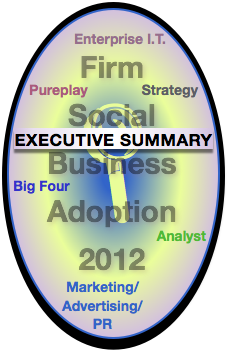 Advisory & Services Firm Social Business Adoption 2012 is a research survey that looks at social business advisory/consulting firms in a new way. Using quantitative methods, I compared consultancies according to the needs of clients who want to transform their organizations with social business. The twelve metrics measure firms’ performance in business impact, sociality, and transformation areas, and they rank firms within firm categories and overall. Advisory & Services Firm Social Business Adoption 2012 is a research survey that looks at social business advisory/consulting firms in a new way. Using quantitative methods, I compared consultancies according to the needs of clients who want to transform their organizations with social business. The twelve metrics measure firms’ performance in business impact, sociality, and transformation areas, and they rank firms within firm categories and overall.
Now prospective clients can compare Strategy firms, Big Four firms, Agencies, Analysts, Enterprise IT firms, and Pureplays quantitatively. Moreover, consulting firms can use these metrics for guidance in building out their social business practices.
I launched CSRA in 2006, and we have always practiced social business as transformation. Client work in social business transformation enables me to see where the market is going, so this survey considers social business firms from that future state.
[UPDATE 8 Mar] Now available: “Executive Briefing” is even more summarized (14-slides) in two versions: Guidance for Clients and Guidance for Firms. Research survey results will be most useful if you […]
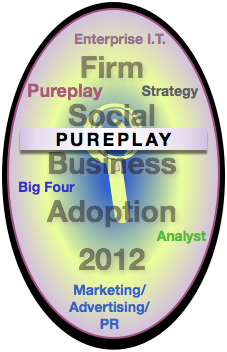 Pureplays address social business as transformation by definition because they have been launched to address emerging market needs that established players either do not yet understand or have yet to organize to address. Moreover, Pureplays are not adding social business to their existing services; they have been formed to practice social business. They are a small cohort in this research survey because they were constrained to social business and transformation as were advisory firms in other categories. Pureplays address social business as transformation by definition because they have been launched to address emerging market needs that established players either do not yet understand or have yet to organize to address. Moreover, Pureplays are not adding social business to their existing services; they have been formed to practice social business. They are a small cohort in this research survey because they were constrained to social business and transformation as were advisory firms in other categories.
Pureplay firms are often smallish startups, so they are quite limited in some areas when compared to established legacy firms as in this research survey. From a market and client perspective, Pureplays represent a vital part of the market and can offer unique capabilities; however, clients need to approach them with “eyes wide open” because the way they serve clients varies considerably.
There are thousands of social media advisory Pureplay firms that are focused on marketing and promotion. Pureplays’ capabilities are largely colored by their founders’ backgrounds. Dachis Group, SideraWorks and SocialxDesign directly […]
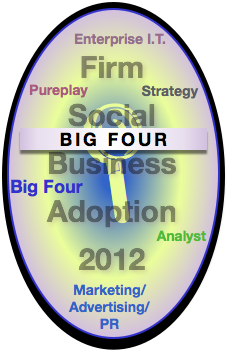 [UPDATED] The Big Four accountancies have been rebuilding their advisory practices for the past several years, and social business transformation fits with their core competencies in important ways. Like Strategy firms, they have been watching adoption and producing thought leadership on various aspects of social technologies’ relevance to business. Their approach also resembles that of strategy firms in that they have relatively low evidence of social business practice. [UPDATED] The Big Four accountancies have been rebuilding their advisory practices for the past several years, and social business transformation fits with their core competencies in important ways. Like Strategy firms, they have been watching adoption and producing thought leadership on various aspects of social technologies’ relevance to business. Their approach also resembles that of strategy firms in that they have relatively low evidence of social business practice.
Big Four firms are well positioned to evolve into social business consultancies because they have core competencies in business strategy and business process transformation. However, they will be challenged by their relative lack of core communications skills and awareness of “soft” social, people and behavioral knowledge.
Deloitte has been an early adopter of social business as a concept, perhaps because it did not shed its consulting practice in the early 2000s as all others did. PwC acquired boutique social business consultancy Ant’s Eye View in 2012, which shows its intention to integrate social business more deeply into its Customer Impact practice.
[…]
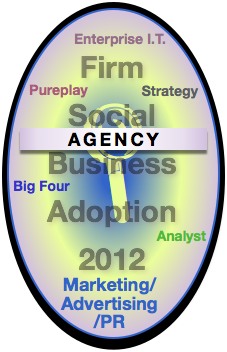 [UPDATED] Marketing, advertising and public relations (MAP) agencies have comprised the largest share of the “social” advisory and execution firms for many years. Most of the other advisory firms are relative late entrants, with the exception of some Analyst and Enterprise I.T. firms. Communication forms the core of social technologies, and MAP agencies have been pivotal in leading the growth of social media activity in their clients, many of the largest brands in the world. [UPDATED] Marketing, advertising and public relations (MAP) agencies have comprised the largest share of the “social” advisory and execution firms for many years. Most of the other advisory firms are relative late entrants, with the exception of some Analyst and Enterprise I.T. firms. Communication forms the core of social technologies, and MAP agencies have been pivotal in leading the growth of social media activity in their clients, many of the largest brands in the world.
However, this research survey argues that, although social media will remain an important portion of the total economic value produced by using social technologies, it will devolve into a minority portion. Collaboration and pervasive innovation will be the majority, which will require enterprise business process transformation. MAP agencies lack competencies in management consulting and enterprise transformation, so they are in an ambiguous situation, being the leaders in social media, a shrinking market in the medium to long term. This report shows how agencies can navigate these rapids and how their clients might best partner with them […]
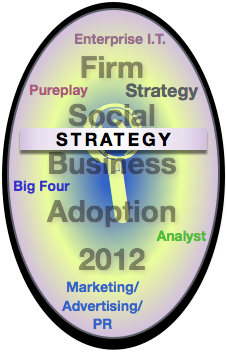 [UPDATED] Strategy firms are the most trusted names sought by CEOs and boards of directors who are reevaluating their companies’ identities, strategies and operations. Strategy firms have been making measured investments in social business over the last few years. Their knowledge of enterprise transformation is deep and broad, and they all have proprietary methodologies for most aspects of the strategy and transformation life cycle. They have deep and broad expertise in market analysis, competitive analysis corporate core competency analysis and virtually all aspects of operations. Many firms have large business transformation practices that explicitly guide clients through profound redefinition and change. [UPDATED] Strategy firms are the most trusted names sought by CEOs and boards of directors who are reevaluating their companies’ identities, strategies and operations. Strategy firms have been making measured investments in social business over the last few years. Their knowledge of enterprise transformation is deep and broad, and they all have proprietary methodologies for most aspects of the strategy and transformation life cycle. They have deep and broad expertise in market analysis, competitive analysis corporate core competency analysis and virtually all aspects of operations. Many firms have large business transformation practices that explicitly guide clients through profound redefinition and change.
Strategy firms have extensive core competencies that could enable them to offer social business strategy services. In addition, Strategy firms are significant producers of thought leadership relevant to corporate and business strategy as well as operations. Most firms field high quality management journals whose papers are written by their consultants. Many have research boutiques or even full-fledged businesses for research and thought leadership. However, they are challenged by very conservative […]
![Social Media Upgrade [Social Business Team Building] case1](http://rollyson.net/wp-content/uploads/2013/04/sbtb1.png) [Updated] The Social Media Upgrade applies to most consumer-oriented brands that have been outsourcing much of their social media work to agencies. In 2013, digital marketing and brand executives are thinking about building their internal teams to provide more continuity and scale. [Updated] The Social Media Upgrade applies to most consumer-oriented brands that have been outsourcing much of their social media work to agencies. In 2013, digital marketing and brand executives are thinking about building their internal teams to provide more continuity and scale.
Social Media Upgrade is the first of the five-part social business team building series The series describes team building in the context of various scenarios in which firms build social business capability, step by step, while investing wisely. Social Business Strategy Use Cases outlines and compares all five use cases while Social Business Team Building gives general guidance for how to create social business teams as well as recommendations for what characteristics leaders have, so I recommend reading them, too.
[…]
 [UPDATED] Several times over the past few years, I have been contacted by major brands to advise them on finding a “social media executive” to help them “figure out social media” and “create a strategy.” In 2012, many firms began building social media teams in earnest, and this trend will continue to grow in the years ahead. Firms are also bringing “social media work” inside after having outsourced it to agencies. All of my client work has involved helping clients to build social business competency and teams, so here I’ll offer some pointers for how to build teams and avoid the pitfalls most companies experience. [UPDATED] Several times over the past few years, I have been contacted by major brands to advise them on finding a “social media executive” to help them “figure out social media” and “create a strategy.” In 2012, many firms began building social media teams in earnest, and this trend will continue to grow in the years ahead. Firms are also bringing “social media work” inside after having outsourced it to agencies. All of my client work has involved helping clients to build social business competency and teams, so here I’ll offer some pointers for how to build teams and avoid the pitfalls most companies experience.
Although each organization’s culture is different, the CEO, CDO, CMO or CAO will be happier with the social business investment if s/he doesn’t invest far ahead of return on investment, which remains low at firms that insist on “business-meaningful” metrics, not the PR- or “brand-building” variety. It’s a chicken-and-egg challenge: how do you know what kind of team to build until you’re achieving real business-meaningful returns on your social business initiatives?
[…]
|
|
![Herd the Cats [Social Business Team Building] Case4](http://rollyson.net/wp-content/uploads/2013/04/sbtb4.png) [UPDATED] Herd the Cats is usually initiated by the CMO/CDO (Chief Digital Officer) or other enterprise practice or brand executive who discovers that various business units or brands in the organization have diverse social media presences without much apparent direction or business results. S/He wants to use strategy to provide a keel that resonates with corporate strategy, addressing issues as diverse as corporate citizenship, community, health or policy.
[UPDATED] Herd the Cats is usually initiated by the CMO/CDO (Chief Digital Officer) or other enterprise practice or brand executive who discovers that various business units or brands in the organization have diverse social media presences without much apparent direction or business results. S/He wants to use strategy to provide a keel that resonates with corporate strategy, addressing issues as diverse as corporate citizenship, community, health or policy.
 Anonymity, Marketing and Predicting the Future shows that, although each culture has its own concepts of “anonymity” and “marketing,” anonymity will prove to have been a temporary phenomenon in most human cultures because communications technologies are counteracting it. Moreover, based on my studies of and experience with sociology, evolutionary psychology and technology, I observe that 20th century marketing is grounded in anonymity, so we can predict the future of marketing by exploring anonymity and its relationship to marketing.
Anonymity, Marketing and Predicting the Future shows that, although each culture has its own concepts of “anonymity” and “marketing,” anonymity will prove to have been a temporary phenomenon in most human cultures because communications technologies are counteracting it. Moreover, based on my studies of and experience with sociology, evolutionary psychology and technology, I observe that 20th century marketing is grounded in anonymity, so we can predict the future of marketing by exploring anonymity and its relationship to marketing.![Catch Social Media Leaders [Social Business Team Building] case3](http://rollyson.net/wp-content/uploads/2013/04/sbtb3.png) [UPDATED] Catch Social Media Leaders applies to organizations with very conservative cultures—banks, insurers, healthcare, governments, B2B firms, and professional services to name a few—that have sat on the sidelines and now feel nervous because they are so far behind. In 2013, digital marketing and firm executives are thinking about building their internal teams to provide more continuity and scale, so here I’ll show how firms can use strategy and best practices to outperform rivals across the social business life cycle.
[UPDATED] Catch Social Media Leaders applies to organizations with very conservative cultures—banks, insurers, healthcare, governments, B2B firms, and professional services to name a few—that have sat on the sidelines and now feel nervous because they are so far behind. In 2013, digital marketing and firm executives are thinking about building their internal teams to provide more continuity and scale, so here I’ll show how firms can use strategy and best practices to outperform rivals across the social business life cycle. Advisory & Services Firm Social Business Adoption 2012 is a research survey that looks at social business advisory/consulting firms in a new way. Using quantitative methods, I compared consultancies according to the needs of clients who want to transform their organizations with social business. The twelve metrics measure firms’ performance in business impact, sociality, and transformation areas, and they rank firms within firm categories and overall.
Advisory & Services Firm Social Business Adoption 2012 is a research survey that looks at social business advisory/consulting firms in a new way. Using quantitative methods, I compared consultancies according to the needs of clients who want to transform their organizations with social business. The twelve metrics measure firms’ performance in business impact, sociality, and transformation areas, and they rank firms within firm categories and overall. Pureplays address social business as transformation by definition because they have been launched to address emerging market needs that established players either do not yet understand or have yet to organize to address. Moreover, Pureplays are not adding social business to their existing services; they have been formed to practice social business. They are a small cohort in this research survey because they were constrained to social business and transformation as were advisory firms in other categories.
Pureplays address social business as transformation by definition because they have been launched to address emerging market needs that established players either do not yet understand or have yet to organize to address. Moreover, Pureplays are not adding social business to their existing services; they have been formed to practice social business. They are a small cohort in this research survey because they were constrained to social business and transformation as were advisory firms in other categories. [UPDATED] The Big Four accountancies have been rebuilding their advisory practices for the past several years, and social business transformation fits with their core competencies in important ways. Like Strategy firms, they have been watching adoption and producing thought leadership on various aspects of social technologies’ relevance to business. Their approach also resembles that of strategy firms in that they have relatively low evidence of social business practice.
[UPDATED] The Big Four accountancies have been rebuilding their advisory practices for the past several years, and social business transformation fits with their core competencies in important ways. Like Strategy firms, they have been watching adoption and producing thought leadership on various aspects of social technologies’ relevance to business. Their approach also resembles that of strategy firms in that they have relatively low evidence of social business practice. [UPDATED] Marketing, advertising and public relations (MAP) agencies have comprised the largest share of the “social” advisory and execution firms for many years. Most of the other advisory firms are relative late entrants, with the exception of some Analyst and Enterprise I.T. firms. Communication forms the core of social technologies, and MAP agencies have been pivotal in leading the growth of social media activity in their clients, many of the largest brands in the world.
[UPDATED] Marketing, advertising and public relations (MAP) agencies have comprised the largest share of the “social” advisory and execution firms for many years. Most of the other advisory firms are relative late entrants, with the exception of some Analyst and Enterprise I.T. firms. Communication forms the core of social technologies, and MAP agencies have been pivotal in leading the growth of social media activity in their clients, many of the largest brands in the world. [UPDATED] Strategy firms are the most trusted names sought by CEOs and boards of directors who are reevaluating their companies’ identities, strategies and operations. Strategy firms have been making measured investments in social business over the last few years. Their knowledge of enterprise transformation is deep and broad, and they all have proprietary methodologies for most aspects of the strategy and transformation life cycle. They have deep and broad expertise in market analysis, competitive analysis corporate core competency analysis and virtually all aspects of operations. Many firms have large business transformation practices that explicitly guide clients through profound redefinition and change.
[UPDATED] Strategy firms are the most trusted names sought by CEOs and boards of directors who are reevaluating their companies’ identities, strategies and operations. Strategy firms have been making measured investments in social business over the last few years. Their knowledge of enterprise transformation is deep and broad, and they all have proprietary methodologies for most aspects of the strategy and transformation life cycle. They have deep and broad expertise in market analysis, competitive analysis corporate core competency analysis and virtually all aspects of operations. Many firms have large business transformation practices that explicitly guide clients through profound redefinition and change.![Social Media Upgrade [Social Business Team Building] case1](http://rollyson.net/wp-content/uploads/2013/04/sbtb1.png) [Updated] The Social Media Upgrade applies to most consumer-oriented brands that have been outsourcing much of their social media work to agencies. In 2013, digital marketing and brand executives are thinking about building their internal teams to provide more continuity and scale.
[Updated] The Social Media Upgrade applies to most consumer-oriented brands that have been outsourcing much of their social media work to agencies. In 2013, digital marketing and brand executives are thinking about building their internal teams to provide more continuity and scale. [UPDATED] Several times over the past few years, I have been contacted by major brands to advise them on finding a “social media executive” to help them “figure out social media” and “create a strategy.” In 2012, many firms began building social media teams in earnest, and this trend will continue to grow in the years ahead. Firms are also bringing “social media work” inside after having outsourced it to agencies. All of my client work has involved helping clients to build social business competency and teams, so here I’ll offer some pointers for how to build teams and avoid the pitfalls most companies experience.
[UPDATED] Several times over the past few years, I have been contacted by major brands to advise them on finding a “social media executive” to help them “figure out social media” and “create a strategy.” In 2012, many firms began building social media teams in earnest, and this trend will continue to grow in the years ahead. Firms are also bringing “social media work” inside after having outsourced it to agencies. All of my client work has involved helping clients to build social business competency and teams, so here I’ll offer some pointers for how to build teams and avoid the pitfalls most companies experience.